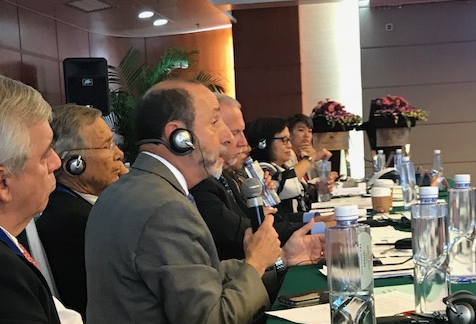McCourt Expert Shares Insights on Juvenile Justice as Part of Delegation to China
Earlier this month, Professor Shay Bilchik, founder and director of the Center for Juvenile Justice Reform at Georgetown University’s McCourt School of Public Policy, joined a U.S. delegation to China to exchange ideas with Chinese Court officials on the operation of juvenile justice systems. He was formally invited by the People’s Republic of China’s Supreme Court and the Dui Hua Foundation.

Earlier this month, Professor Shay Bilchik, founder and director of the Center for Juvenile Justice Reform(CJJR) at Georgetown University’s McCourt School of Public Policy, joined a U.S. delegation to China to exchange ideas with Chinese Court officials on the operation of juvenile justice systems. He was formally invited by the People’s Republic of China’s Supreme Court and the Dui Hua Foundation.
Bilchik found the exchange between the US and Chinese delegates to be very insightful.
“It was a remarkable experience that I believe has set the stage for future dialogues and the greater exploration of each other’s work in this area,” he said.
Influences and Challenges
There were a number of key things that captured Bilchik’s attention during the meetings with his Chinese counterparts. First, one of the major goals for the Chinese juvenile justice system is to treat offenders as children rather than as criminals, which Bilchik said is heavily influenced by Confucianism. Bilchik explained that the U.S. juvenile justice system takes a similar approach.
“While both systems are far from perfect in their execution of those fundamental values, they provide a strong framework for the reform efforts underway in both countries,” he said.
Bilchik also learned about the challenges China is encountering as it attempts to standardize the delivery of juvenile justice policy across the entire country, especially in rural China.
“In the villages alone, there are over 500 million residents representing over 50 ethnic backgrounds,” he explained. For this reason, there is a lot of variability in the resources that courts have to adequately staff the juvenile court cases assigned to them.
Stronger Infrastructure
Another takeaway for Bilchik was a presentation by Judge Wang Jianping that called for institutional reforms, including reasonable caseloads that consider the expertise and time commitment to preside over a juvenile court case, adequate court personnel to individualize each case and a strong performance appraisal system that utilizes quantitative and qualitative measures.
“It will only be through the development of this strong infrastructure that every child and family, regardless of court structure, receives the benefit of evidence-based practices and a fair and equitable court experience,” Bilchik said.
Bilchik also has confidence that China will adopt some of the decision-making tools that the U.S. delegation described in their presentation.
“This will include the enhancement of the data systems needed to support the work of the juvenile court, both in tracking the performance of the system and in providing the data needed to validate assessment tools and develop dispositional matrices for the various provinces, counties and townships across the country.”
Additionally, Bilchik believes that the juvenile court system in China could benefit from the creation of an agency similar to the Office of Juvenile Justice and Delinquency Prevention in the U.S. Department of Justice.
“This type of organization would help to further bring to life the goals established by the Juvenile Protection Law and the Juvenile Delinquency Prevention Law, promoting evidence-based policies and practices consistent with those laws,” Bilchik explained.
While he would have loved to spend more time working with the Chinese delegation, overall Bilchik believes the seminar to have been a great success.
“It is my hope and expectation that these relationships will bear fruit in the future, primarily in improved system performance in both countries and better outcomes for the children, youth and families we serve.”
To learn more about Professor Shay Bilchik’s work, visit the CJJR website.